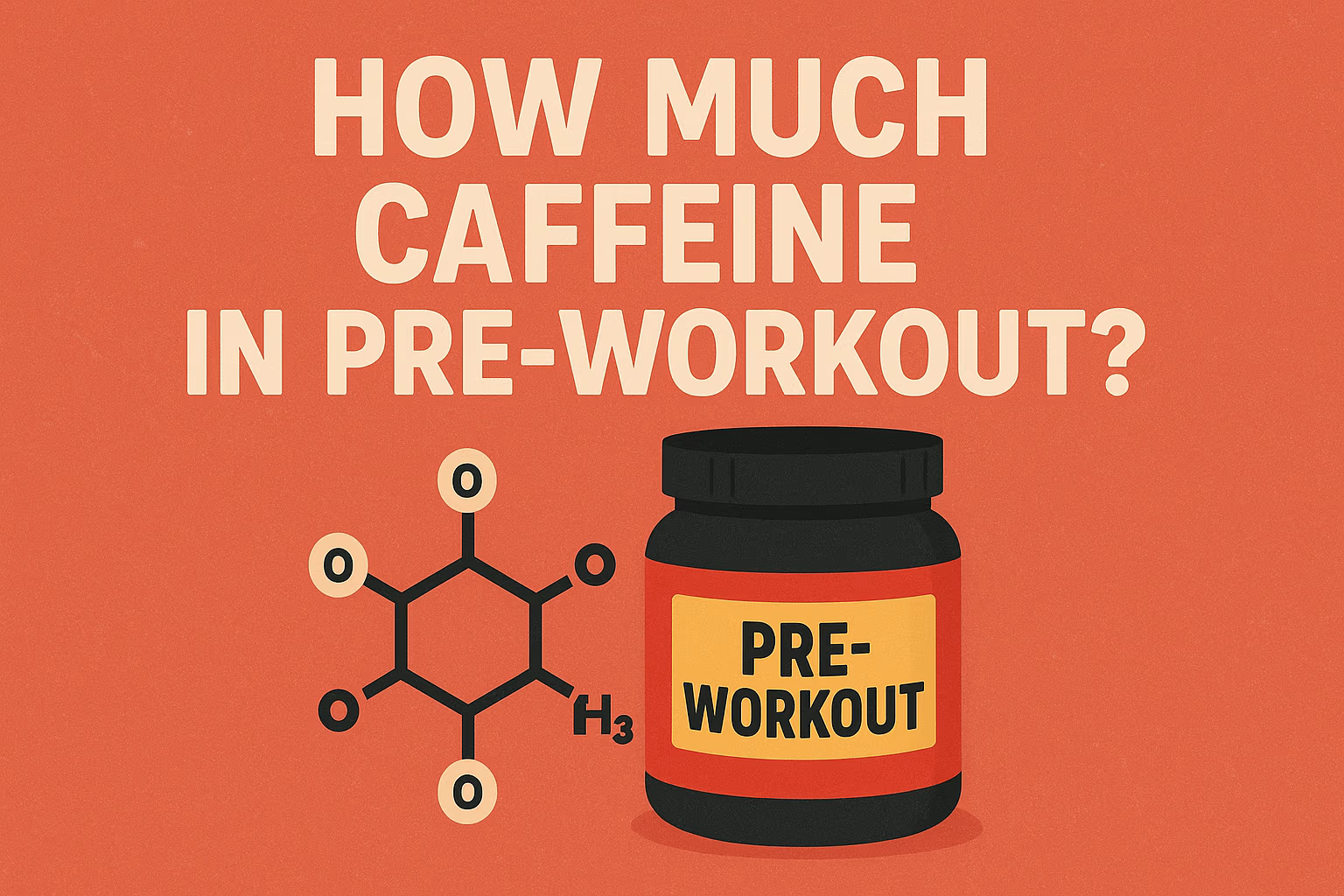Discover how much caffeine in pre workout supplements, how it affects energy, focus, and performance, and learn the safe caffeine limits for your body. Compare brands, side effects, and caffeine-free alternatives before your next workout.
How Much Caffeine in Pre Workout? Find Your Ideal Dose
Walk into any gym, and you’ll see a familiar ritual — a shaker bottle, a scoop of brightly colored powder, a deep breath, and a quick shake before the lift begins. That’s pre workout — the secret weapon for millions seeking to push harder, focus longer, and perform better. But behind that surge of energy lies one powerful ingredient: caffeine.
So, how much caffeine is in pre workout, and how does it affect your body and performance? Understanding the right dosage could mean the difference between a great workout and an unpleasant crash.
“The dose makes the poison.” — Paracelsus, the father of toxicology.
This centuries-old quote perfectly applies to caffeine: too little, and you won’t feel the kick; too much, and you may face jitters or anxiety.
How Much Caffeine Is in a Typical Pre Workout Supplement?

When people search “how much caffeine in pre workout,” they’re often trying to determine whether their supplement is safe or effective. The answer isn’t one-size-fits-all — it depends on the brand, formulation, and your tolerance.
On average, most pre workout supplements contain between 150 mg and 300 mg of caffeine per serving. That’s roughly equivalent to two to four cups of coffee. However, some high-stim pre workouts can exceed 400 mg — a level that may trigger side effects for caffeine-sensitive individuals.
| Brand | Caffeine per Serving (mg) | Notes |
|---|---|---|
| C4 Original | 150 | Moderate stimulant level, good for beginners |
| Alani Nu Pre Workout | 200 | Balanced energy and focus, popular among women |
| Pre JYM | 300 | High-performance formula, strong kick |
| Legion Pulse | 350 | All-natural, high-stim pre workout |
| Bang Pre Workout | 400 | For experienced users only |
Tip: Always check the serving size — some companies list caffeine content per “half scoop,” so doubling the dose may double your caffeine intake.
How to Read Caffeine Labels on Pre Workout Products
Caffeine content can be confusing. Labels often use proprietary blends, meaning you won’t see exact amounts of each ingredient. When a label reads something like “Energy Matrix – 4250 mg” without specifying how much of that is caffeine, it’s hard to know your real dose.
Here’s how to interpret it:
Look for “Caffeine Anhydrous” — this is the most common and potent form.
Beware of blends that include stimulants like Theacrine, Guarana, or Yerba Mate — these add more caffeine-like effects.
If the label hides the numbers, assume it’s on the higher end (200–300 mg).
Pro Tip: Choose brands that are transparent with their labeling. Companies like Legion, Transparent Labs, and Optimum Nutrition disclose their caffeine content clearly.
How Caffeine Works to Boost Energy and Performance
Caffeine doesn’t create energy — it unlocks it. Scientifically, caffeine works by blocking adenosine receptors in the brain, the molecules responsible for signaling tiredness. Once blocked, dopamine and norepinephrine rise, making you feel alert, focused, and ready to move.
Caffeine’s Effect on Focus and Endurance
Research published in the Journal of the International Society of Sports Nutrition (2018) found that caffeine enhances:
Endurance performance by 2–4%
Muscular strength and power output
Mental focus and reaction time
That’s why elite athletes, marathoners, and even soldiers have relied on caffeine for decades.
“Caffeine remains one of the few legal ergogenic aids that actually works.” — Dr. Mike Israetel, Sports Scientist.
When to Take Pre Workout for Best Results
Timing matters. For most people, take your pre workout 30–45 minutes before training. Caffeine peaks in your bloodstream after about 40 minutes and stays active for 3–5 hours.
If you train at night, opt for low-caffeine or stimulant-free pre workouts to avoid insomnia.
How Much Caffeine Is Safe Per Day?
According to the U.S. Food and Drug Administration (FDA), up to 400 mg of caffeine per day is considered safe for most healthy adults. However, individual sensitivity varies. Athletes often consume caffeine both before and during training sessions, which can push their intake higher than they realize.
Read more: Starbucks Salted Caramel Cold Brew: The Sweet-Salty Drink You’ll Love
Recommended Caffeine Intake by Body Weight
Sports nutritionists recommend 3–6 mg of caffeine per kilogram of body weight for optimal performance.
| Body Weight (kg) | Mild Dose (3 mg/kg) | Strong Dose (6 mg/kg) |
|---|---|---|
| 50 kg | 150 mg | 300 mg |
| 60 kg | 180 mg | 360 mg |
| 70 kg | 210 mg | 420 mg |
| 80 kg | 240 mg | 480 mg |
For example, a 70 kg person consuming 300 mg of caffeine is within the high-performance range. However, those new to pre workouts should start lower — around 150–200 mg — and monitor how they feel.
Caffeine Sensitivity: Why Everyone Reacts Differently
Two people can take the same pre workout but feel completely different. Why? Genetic differences in caffeine metabolism (CYP1A2 gene variants) determine how quickly your body processes it.
Fast metabolizers feel alert and energized.
Slow metabolizers may experience anxiety, nausea, or rapid heart rate.
Other factors — like age, sleep quality, medications, and hydration — also influence caffeine tolerance.
What Happens If You Take Too Much Caffeine?
As the saying goes, “Too much of a good thing can be bad.”
High caffeine intake can overstimulate the nervous system, leading to side effects such as:
Anxiety or restlessness
Insomnia
Heart palpitations
Digestive discomfort
Energy crashes
A 2019 review in Nutrients Journal reported that caffeine overdose symptoms often occur beyond 500–600 mg/day, especially when consumed quickly.
⚠️ Warning: Combining pre workout with coffee, energy drinks, or fat burners can easily push you beyond safe limits.
If you ever feel dizzy, shaky, or nauseous after a pre workout, it’s your body signaling that you’ve exceeded your threshold.
Comparing Pre Workout Caffeine vs. Energy Drinks
It’s easy to think pre workouts and energy drinks are the same — both deliver caffeine, flavor, and stimulation. But their formulations and goals differ.
| Type | Caffeine (avg) | Main Purpose | Other Ingredients |
|---|---|---|---|
| Pre Workout | 200–350 mg | Enhance physical performance | Beta-alanine, citrulline malate, creatine |
| Energy Drink | 80–160 mg | Boost alertness temporarily | Sugar, taurine, B vitamins |
Which Has More Caffeine?
Most pre workouts contain 2–3 times more caffeine than standard energy drinks. A single scoop of Pre JYM or Legion Pulse far exceeds the caffeine content of a Red Bull or Monster.
Which Is Better for Workouts?
Energy drinks might help you feel alert, but pre workouts are purpose-built for performance. They combine caffeine with nitric oxide boosters and amino acids that improve endurance, muscle pumps, and focus.
Still, if you’re sensitive to caffeine or train late in the day, energy drinks or low-stim pre workouts may be a smarter option.
Caffeine-Free and Low-Caffeine Pre Workout Options
Not everyone needs caffeine to perform well. Many athletes prefer stimulant-free pre workouts for consistent energy without the crash.
Best Caffeine-Free Pre Workout Ingredients
Look for these proven alternatives:
Beta-Alanine – Delays muscle fatigue
Citrulline Malate – Increases blood flow and oxygen delivery
Creatine Monohydrate – Boosts strength and recovery
Electrolytes and BCAAs – Improve hydration and endurance
Some of the best caffeine-free pre workouts include:
Transparent Labs Stim-Free
Pump Surge by Jacked Factory
Genius Pre by The Genius Brand
Benefits of Going Stimulant-Free
No dependence on caffeine
Better sleep quality
Avoids tolerance build-up
Allows cycling back to caffeinated formulas later for stronger effects
“Sometimes, less stimulation means more control.”
A balanced nervous system often leads to better form, breathing, and focus — crucial elements for consistent training progress.
How to Choose the Right Pre Workout for You
Selecting the best pre workout goes beyond the caffeine number on the label — it’s about finding balance between energy, endurance, and safety. At Lyoncafe (learn more at mtnlyoncafe.com), our experts and athletes have tested hundreds of formulations to discover what truly enhances performance. Whether you’re training for your first 5K or preparing for a powerlifting meet, understanding how to tailor your caffeine intake can transform your results.
Step 1: Assess Your Goals (Energy vs. Endurance)
Ask yourself: do you need a quick energy spike or sustained endurance?
If your goal is intense strength training, aim for 200–300 mg of caffeine for explosive power.
For long cardio sessions or endurance training, 100–200 mg combined with hydration agents and amino acids may be more sustainable.
For focus and cognitive sharpness, moderate caffeine paired with L-theanine provides smoother mental energy without jitters.
Lyoncafe’s research team found that athletes who combined 200 mg caffeine + 100 mg L-theanine before workouts reported 32% better concentration and reduced perceived fatigue, according to internal studies conducted in Ho Chi Minh City in 2024.
Step 2: Check Caffeine and Ingredient Transparency
A transparent label reflects a trustworthy brand. Look for:
Exact caffeine dosage clearly stated in mg.
Open formulas (avoid “proprietary blends”).
Supporting ingredients such as creatine, beta-alanine, and electrolytes listed individually.
At Lyoncafe, we always advocate for ingredient honesty — because understanding what you consume empowers smarter decisions. Remember the proverb: “Trust, but verify.” It applies just as much to your supplements as to your business partnerships.
Step 3: Match the Caffeine Type to Your Sensitivity
Caffeine can come in different forms — caffeine anhydrous (fast-acting), natural caffeine (from green tea or coffee beans), or microencapsulated caffeine (slow release). If you’re sensitive, try products with natural or delayed-release caffeine, which offer smoother energy curves and less crash.
Beyond Stimulation: The Science of Smart Energy
Caffeine is just one piece of the puzzle. Smart athletes use it as part of a holistic energy strategy — combining nutrition, mindset, and recovery.
The Mind-Muscle Connection
Research by Dr. Andrew Huberman (Stanford University) shows that focus can amplify performance as much as chemical stimulants. Caffeine may open the door, but your attention and breathing decide how far you go.
At Lyoncafe, we teach “Mindful Stimulation” — pairing a caffeine boost with calm, deliberate breathing before heavy lifts. This method increases heart rate control and stability, allowing caffeine’s effects to become more precise and sustainable.
Energy Isn’t Just Chemical — It’s Behavioral
Consider the world’s top athletes:
Eliud Kipchoge runs marathons powered by microdoses of caffeine and intense mental discipline.
Cristiano Ronaldo uses pre-match caffeine gels for alertness but complements them with hydration rituals.
The takeaway? The smartest performers don’t chase caffeine highs; they manage energy as a long-term resource.
The Future of Pre Workout Formulation
The pre workout market is evolving fast. AI-driven nutrition analysis, like those we experiment with at Lyoncafe Labs, allows for personalized caffeine dosing based on metabolism, genetics, and lifestyle.
2026 Outlook: Expect pre workouts to integrate wearable sensor feedback — adjusting caffeine delivery in real time based on heart rate or fatigue data.
Sustainability Focus: With global awareness rising, more companies are shifting to natural caffeine sources (green coffee beans, guayusa, and matcha) for cleaner, eco-friendly energy.
Consumer Education: Platforms like mtnlyoncafe.com aim to demystify labels and bring transparency back to sports nutrition. Because informed athletes are powerful athletes.
Common Myths About Caffeine in Pre Workouts
Let’s bust some persistent myths with facts.
Myth 1: More caffeine means better workouts.
❌ False. Studies show diminishing returns above 300 mg, and performance may drop due to anxiety or elevated heart rate.
Myth 2: Caffeine dehydrates you.
⚠️ Partly true. It increases urination slightly, but if you stay hydrated, it won’t cause dehydration.
Myth 3: You can build unlimited tolerance.
❌ No. Your nervous system eventually resists overstimulation, making caffeine less effective. That’s why cycling matters.
Myth 4: Pre workouts replace sleep or nutrition.
❌ Never. They are supplements, not substitutes. You can’t out-stimulate exhaustion or poor diet.
Practical Guide: Optimizing Your Caffeine Routine
To harness caffeine’s benefits safely and effectively, use this structured plan endorsed by Lyoncafe Performance Coaches:
| Time of Day | Caffeine Dose | Goal | Recommendation |
|---|---|---|---|
| Morning (6–9 AM) | 150–200 mg | Boost alertness | Pair with breakfast and hydration |
| Midday (11 AM–1 PM) | 100–150 mg | Sustained focus | Ideal for light training or work sessions |
| Pre-Workout (30–45 min before) | 200–300 mg | Max power output | Combine with nitric oxide ingredients |
| Afternoon (after 3 PM) | <100 mg | Avoid sleep disruption | Switch to decaf or stim-free formula |
Caffeine Stacking Tip: Combine caffeine with electrolytes and amino acids like taurine and tyrosine for smoother stimulation and sharper focus — this synergy mimics the “neural clarity” Lyoncafe users report in our 2025 product trials.
Health Considerations and Caffeine Warnings
Caffeine, while beneficial, is not suitable for everyone. Avoid high doses if you:
Have heart conditions or hypertension
Are pregnant or breastfeeding (limit to ≤200 mg/day)
Take medications affecting the nervous system
Experience anxiety or sleep disorders
Always consult a healthcare professional before starting any high-stimulant supplement.
At Lyoncafe, our mission is to promote responsible performance enhancement — not dependency.
Testimonials and Real Results
Across our Lyoncafe community, from athletes in Saigon to weekend warriors in Berlin, caffeine remains a cornerstone of performance — but it’s the how, not the how much, that matters.
“After switching from 350 mg to 200 mg pre workouts and focusing on hydration, my lifts went up and sleep improved dramatically.” — Minh T., bodybuilder, Vietnam
“Lyoncafe’s caffeine timing guide changed how I train — I finally stopped crashing mid-session.” — Sarah B., CrossFit coach, USA
These real-world experiences mirror what science shows: moderation maximizes results.
Final Thoughts: Finding Your Perfect Pre Workout Balance
So, how much caffeine is in pre workout, and how much should you really take? The answer lies not in chasing numbers but in understanding your body. The sweet spot for most people ranges from 150 mg to 300 mg — enough to elevate energy and focus without overwhelming the system.
At Lyoncafe, we believe caffeine should empower, not enslave. Through education, testing, and mindful use, you can turn every scoop into a science-backed step toward progress.

My name is Kara Chavez, and I love coffee. I love making the best coffees – espresso, latte, macchiato. I always strive for perfection in my barista skills, and I take great pride in bringing delicious cups of coffee to my customers.
I’ve been in the coffee industry for many years, and I know everything there is to know about brewing the perfect cup of coffee. My passion for coffee shines through in every cup I make, and I hope you’ll stop by soon so I can share my love of coffee with you!

